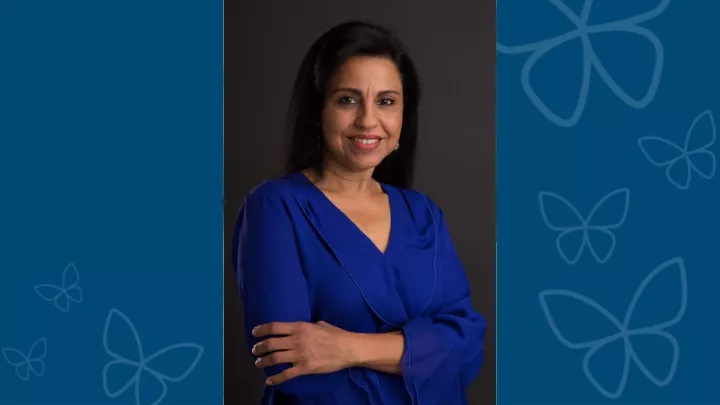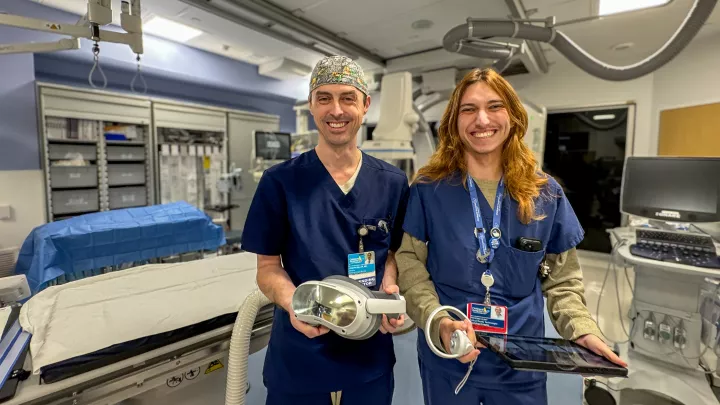Computed Tomography (CT) Scan
A computed tomography (CT) scan takes X-ray images from multiple angles. Special technology assembles them to provide enhanced views of organs, bones and soft tissue. Having all this information available from one imaging study supports comprehensive evaluations that lead to exceptional care.
At Children’s Hospital Los Angeles, your child benefits from trusted pediatric radiologists who use the best available technology. We capture high-quality images while looking out for your child’s safety and comfort.
Pediatric CT Scans: Why Choose Us
All our radiologists specialize in pediatric imaging, so you can count on us for appropriate testing. We have comprehensive knowledge of the unique requirements of children’s imaging and how it differs from adult imaging. Our experts adjust imaging techniques to your child’s needs. And we detect small details in the results that can significantly impact care and outcomes. Meet our team.
Highlights of our program include:
- Best available technology: Children’s Hospital is home to the most up-to-date CT scanners that enable ultrafast exams. The scanners also minimize noise for a more pleasant experience. Faster and quieter scans make it possible for more children to receive necessary tests without being put to sleep (sedation). Trusted pediatric radiologists guide and interpret your child’s scan.
- Commitment to imaging excellence: Our program maintains American College of Radiology accreditation for CT scans. This prestigious recognition is only awarded to programs like ours that consistently provide high-quality images.
- Child-friendly atmosphere: We take extra steps to help your child have as pleasant an experience as possible. In many cases, a parent is allowed in the imaging area. And our team includes Child Life specialists who use age-appropriate techniques to ease anxiety.
- Expert sedation services: Many children do not require sedation for CT scans at Children’s Hospital. When these services are necessary, we offer an exceptional level of care. Our team includes internationally renowned pediatric anesthesiologists who care for children of all ages.
How Do Pediatric CT Scans Work?
A CT scanner is a large donut-shaped machine. An exam table slides in and out of the machine’s center. Inside the machine is X-ray equipment that rotates around the table. Special software processes the scan to create images of organs, bones and soft tissue structures. The result is a detailed 3D view of the structure made up of many images stacked together, similar to ultra-thin slices of bread coming together to form a loaf.
CT scans use more radiation than X-rays, which is why we only recommend them when we are confident that the benefits outweigh the risks. CT scans provide more detailed images than X-rays. Doctors can rotate the 3D images to assess potential issues from every possible angle. CT scans also help diagnose some complex conditions without more invasive procedures, such as biopsies.
Getting a CT Scan: What to Expect
Before the scan, we provide you and your child with information about what to expect and how to prepare. To find out more, read our radiology and imaging patient and family resources.
Here's what happens during a CT scan:
- Your child lies on a moveable examination table that slides into the CT scanner. A technologist uses special positioning equipment to secure your child to the correct spot on the table.
- Some CT scans require contrast, a special substance that enhances images of specific areas. This may require an injection or swallowing the substance.
- We slide the table into the CT scanner.
- The technologist goes into a monitoring booth during the test. It has a window facing the CT scanner. If not sedated, your child can communicate with us at any time through speakers in the unit.
- We start scanning, which may only take a few seconds to complete.
- We may need to reposition your child and take additional scans if the test requires images from multiple areas.
- After the test is complete, children who have not undergone sedation are free to go home. Children undergoing sedation move to a recovery area.
Specialized CT Scans We Offer
Children’s Hospital offers specialized CT scans. Some examples include:
- Abdominal and pelvic CT, which enable us to assess digestive system functioning and organs in the pelvis. These include the bladder and colon.
- Bone density scan, which detects signs of bone disease or injury and determine their severity.
- Cardiac CT, which enables us to evaluate heart structures and blood flow.
- CT angiogram, which measures blood flow to specific organs and helps uncover blockages.
- CT scanogram, which measures bone length and tracks bone positioning in the lower extremities. This test helps diagnose limb length discrepancies and assess contractures (deformities) affecting the legs.
- Chest CT scan, which detects heart defects, tumors or airway disorders such as pulmonary hypertension. Find out more about chest CT scans.
- Head CT, which may pinpoint the cause of headaches, seizures and brain bleeds.
Comprehensive Radiology and Imaging Services for Children
We offer the full range of radiology and imaging studies at our main hospital, in one convenient location. Some of these services are also available at locations throughout the Los Angeles region. Find out more about Radiology and Imaging.


